PER BEND
1) In heraldry the term used when a shield, a banner of arms or any
quartering thereof is divided
diagonally from top left to bottom right across its field (see also
‘banner of arms’, ‘bend’,
‘in bend’, ‘party’ and
‘quartering 1)’).
2) In vexillology the term is sometimes used in place of in bend or bendwise when an object,
charge or charges are placed as above (see also ‘armigerous’,
‘descending diagonal 2)’,
‘bicolour 1)’ and
‘crown of rue’).
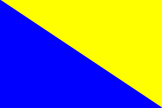

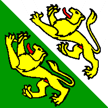
House Flag of BosKalis NV, The Netherlands (fotw); National Arms of
Bosnia-Herzegovina (fotw); Flag of Thurgau, Switzerland (fotw)
PER BEND SINISTER
1) In heraldry the term used when a shield, a banner of arms or any quartering thereof
is divided diagonally from bottom left to top right across its field (see also
‘banner of arms’, ‘bend sinister’,
’in bend sinister’,
‘party’ and
‘quartering 1)’).
2) In vexillology the term is sometimes used in place of in bend sinister or bendwise
sinister when an object, charge or charges are placed as above - but see
‘ascending diagonal 2)’
(also ‘bicolour 1)’).

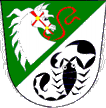
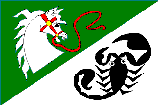
Flag of the Anarcho-Feminists, Germany (fotw);
Arms and Flag of Nehodív, Czech Republic (fotw)
PER CHEVRON
The heraldic term used when the divisions on a shield or banner of arms, or a series of charges thereon,
appear to form a triangle, sometimes embowed and generally (although not invariably) with the apex upward –
but see ‘pile 1)’ and ‘pile 2)’
plus the following note (also ‘banner of arms’, ‘chapé’,
‘chevron 2)’,
‘embowed’,
‘party’ and
‘reversed 2)’).
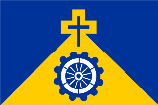
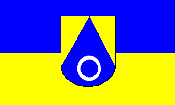

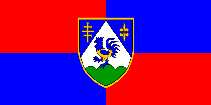
Flag of Alberton, South Africa (fotw); Flag of Neu Wulmstorf, Germany (fotw); Arms and Flag of Koprivnica-Krizevci,
Croatia (fotw).
Please note that the difference between a shield or a banner of arms that is divided “per chevron”
and one showing a “pile reversed” is not always clear, and it is suggested that the note following
‘per pile’ and a glossary or dictionary of heraldry be consulted for further details.
PER CHEVRON EMBOWED (ARCHED or ENARCHED)
See per chevron,
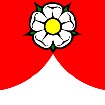
Flag of Seftigen, Switzerland (fotw)
PER COMPLEMENT
See ‘moon 2)’ with following note.
PER FESS
1) In heraldry the term used when a shield, a banner of arms or any
quartering thereof is divided
horizontally (see also ‘banner of arms’, ‘fess’,
‘in fess’,
party and
‘quartering 1)’).
2) In vexillology the term is sometimes also used in place of in fess or fesswise when
an object, charge or charges, appear in a horizontal position.
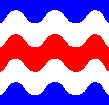

Flag of Medalpad, Sweden (fotw); Arms of Recica ob Savinji, Croatia (fotw)
PER PALE
1) In heraldry the term used when a shield, a banner of arms or any
quartering thereof is divided
vertically (see also ‘banner of arms’, ‘in pale’,
‘pale’, ‘party’
and ‘quartering 1)’).
2) In vexillology the term is sometimes also used in place of in pale or palewise when an object,
charge or charges, appear in a vertical position (see also ‘palewise 2)’).
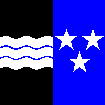
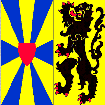
Flag of Aargau, Switzerland (fotw); Flag of
West Flanders, Belgium (fotw)
PER PALL
In heraldry the term used when the division lines on a shield, banner of arms or flag are arranged in the form a pall – see
‘in pall’ and
‘pall 2)’.
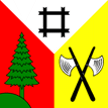
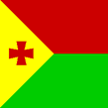
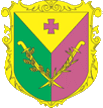
Flag of Fenin-Vilars-Saules, Switzerland (fotw); Flag and Arms of
Olexandria, Ukraine (fotw
PER PILE
See ‘pile 2)’ and the following note.
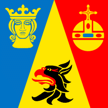

Flag of Stockholm lan, Sweden (fotw); Arms of
Werdohl, Germany (fotw)
Please note that this term should always be used with a further description, for example,
“tierced (or party) per pile reversed” or “tierced/party per pile reversed embowed” –
see ‘embowed’,
‘party’,
‘per chevron’ with its following note,
‘reversed 2)’ and
‘tiercé’.
PER SALTIRE
1) In heraldry the term used when the division lines on a shield, banner
of arms or flag run in a diagonal fashion from the upper corners - saltirewise
- but see note below
(also ‘banner of arms’, ‘in saltire’,
‘party’, and
‘saltire’).
2) In vexillology the term is sometimes also used in place of in saltire or saltirewise
when two separate objects or charges cross each other diagonally - but see
note below (also
‘orthogonal’ and
‘quartered diagonally’).
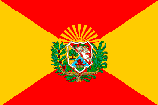
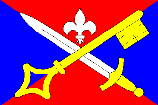
Flag of Aragua, Venezuela (fotw); Flag of Lubenice, Czech Republic (fotw)
Please note with that the standard vexillological term for a flag divided per
saltire is “quartered diagonally” as referenced in 2) above.
PERSONAL FLAG
1) In UK usage, a fringed plain royal blue flag bearing in its centre a crowned
and garlanded ‘E’, and used by HM The Queen when paying official visits abroad
to those countries of which she is not head of state but see note below (also
‘garland’,
‘monogram’,
‘royal cipher 1)’ and
‘royal standard’).
2) See ‘banner of arms’.
3) A flag intended by the designer for his personal use or that of his family
(see also ‘house flag 3)’).
4) In US naval usage, a term for denoting an officer's rank – see ‘flag of
command’ (also ‘distinguishing flag 3)’,
‘individual flag’ and
‘rank flag 1)’).
Please note that the various flags used by HM The
Queen (of Great Britain) when visiting a Commonwealth country of which she is
head of state are also officially described as personal flags, but must also be
considered as the royal standards of the countries concerned (see also
‘royal standard’ and
‘standard 1)’).
![[a personal standard]](../images/v/vxt-d241a.gif)
![[a personal standard]](../images/v/vxt-d1823.gif)
![[a personal standard]](../images/v/vxt-d2815.gif)
Personal Flag of HM The Queen, UK (Graham Bartram); Personal Flag of Terence Martin, US (fotw);
Personal/Rank Flag of an Admiral, USN (fotw)
![[a personal standard]](../images/v/vxt-d241.gif)
Personal Flag/Royal Standard for use in New Zealand (Graham Bartram)
PETRA SANCTA METHOD
See ‘hatching 1)’.

From left: Gules, Azure, Vert. Purpure, Sable, Or and Argent
PHOENIX
A mythical bird which is generally seen rising from the flames of its own destruction,
and is usually intended to symbolise re-birth through strife (see also
‘Appendix V’ and
‘heraldic beasts’).

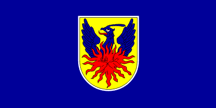
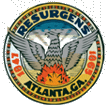
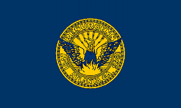

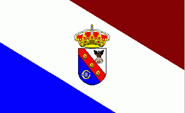





















![[a personal standard]](../images/v/vxt-d241a.gif)
![[a personal standard]](../images/v/vxt-d1823.gif)
![[a personal standard]](../images/v/vxt-d2815.gif)
![[a personal standard]](../images/v/vxt-d241.gif)

![[Phrygian cap]](../images/v/vxt-d489a.gif)
![[Phrygian cap]](../images/v/vxt-d489b.gif)







